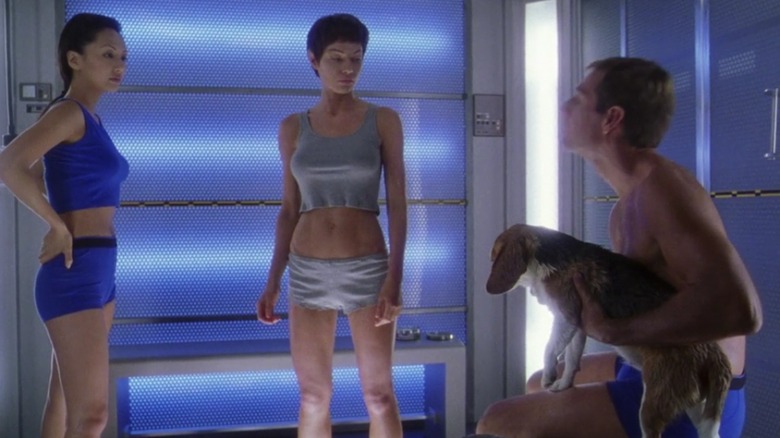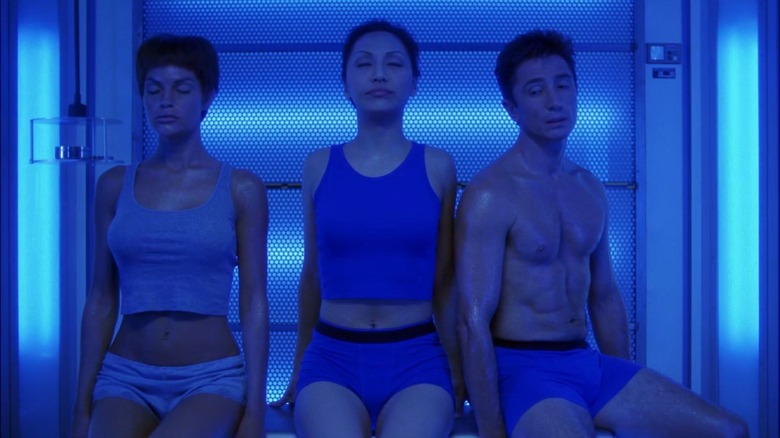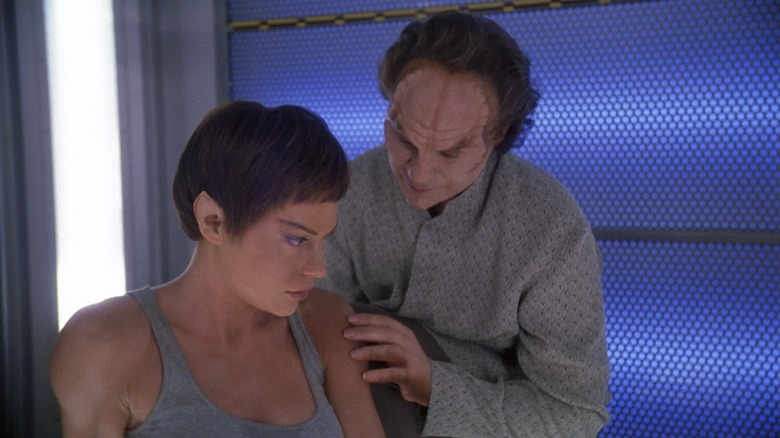Star Trek: Enterprise's Most Contentious Scene Involved T'Pol, Trip, And A Lot Of Goo
Oh no, not the decontamination chamber.
When "Star Trek: Enterprise" debuted in 2001, there was a conscious effort by the showrunners to work in as much brazen sex appeal as they could. Noticeably, the casting directors hired Jolene Blalock, who had worked as a professional model, to play the Vulcan First Officer T'Pol, and the costume designers were careful to outfit her in skin-tight body suits. She was clearly meant to replicate Seven of Nine (Jeri Ryan) from "Star Trek: Voyager."
"Enterprise" was set about a century prior to the original "Star Trek," and some of the more popular "Trek" tech hadn't been invented yet. As such, when a team of officers returned from an away mission, they had to spend a long span in a decontamination chamber. In later other "Trek" shows, the transporters took care of contaminants and idle spores an away mission might have accumulated. On "Enterprise," officers had to enter a blue-lit chamber, strip down to their skivvies(!), and spend a long time massaging some kind of antibacterial gel on each other. Several scenes throughout "Enterprise" luxuriated in the cast members' bodies as they got nearly naked and rubbed each other down. It was thuddingly prurient.
Later in the series, the decontamination scenes would evolve into something even more lascivious. T'Pol and chief engineer "Trip" Tucker (Connor Trinneer) would be ordered to meet in her quarters for Starfleet-mandated naked massages. Both the massages and the decontaminations sound like they were conceived for porno movies.
In the oral history book "The Fifty-Year Mission: The Next 25 Years: From The Next Generation to J. J. Abrams," edited by Mark A. Altman and Edward Gross, the "Enterprise" showrunners talked about the embarrassing sweatiness of the above scenes, and how they weren't very proud of them.
Chris Black admits things got 'a little lurid'
Writer and producer Chris Black noted the above-mentioned parallel to Seven of Nine from "Voyager." Seven of Nine, Trekkies can tell you, was brought into "Voyager" at the end of its third season when ratings were flagging. Jeri Ryan wore a skintight costume, which included built-in high heels and a corset. It was a transparent need to add sex appeal to "Voyager." Black seems to recall that a similar effort was made right from the jump for "Enterprise," notably through the casting of Jolene Blalock and those gooey decontamination scenes. Black said:
"There was an effort to make the show sexier. Obviously, every show has that character. 'Voyager' had Seven of Nine and Jolene was Jolene. This striking actress in a tight outfit. There was a component of that show that was supposed to be sexy. And that goes back to the original series. Look at the costumes originally designed for those women. It's like the joke, something you threw on and almost missed. The decontamination stuff got a little out of hand. I admired what they were trying to do with the T'Pol/Trip relationship. I thought that was interesting."
T'Pol and Trip began to form something of a romance during their intimate massage sessions, and that element of the series, at the very least, interested writers more than stripping the actors down and slathering them up. Black said that the T'Pol/Trip romance would reflect the romance witnessed between Spock's father Sarek (Mark Lenard) and his human mother Amanda (Jane Wyatt). "A marriage with one person who can't be demonstratively passionate or emotional," Black pondered. "What is that like?"
But Black admitted, "[I]t became what it was. A little lurid," adding that "the actors weren't hugely enthusiastic."
The inherent illogic of future salve
Executive producer Manny Coto, who also served as the series showrunner in its third and fourth seasons, recalled the decontamination scenes as not just being lurid, but also technolgically unlikely. Even if "Enterprise" was set at a time before humans were regularly using transporters, surely there was a more efficient way to decontaminate someone than by literally rubbing goo on each other. Of the decontamination scenes, Coto said:
"I thought they were silly; it was less about the obvious attempt to get hot bodies on there, but are you really going to be decontaminated by spreading this gel all over your body? It doesn't seem like a very efficient way to decontaminate. I would rather have them strip and get hit by a beam. Not, 'We're going to spread gel all over each other.' What if you missed a spot?"
So far, no one has accepted blame for the obvious need to cram erotic gel massages into "Star Trek."
Of course, the regular injection of sex-fantasy material into "Star Trek" might be considered an artifact of the 1960s when Gene Roddenberry was in charge. Roddenberry was an infamously horny dude. Starfleet officers wore miniskirts. One needn't look too far into "Star Trek" to find a woman dressed in an impossibly revealing outfit (compliments of costume designer William Ware Theiss). One can see, hiding inside "Star Trek," a definite streak of free love advocacy that Roddenberry was clearly very excited about. As such, there was a thought that "Star Trek" characters might be comfortable with their bodies in the future, and that being naked in front of peers, rubbing goo on their bodies, was not necessarily going to be sexual. Think of the group shower scenes in Paul Verhoeven's "Starship Troopers."
This was the view affected by writer/producer David A. Goodman.
In Star Trek, all clothes should be off
David Goodman's issue with the decontamination scenes was that they should have read as nude, but nonsexual. The problem is any kind of nudity on TV is usually presented as sexual, especially when it's being filmed the way it was on "Enterprise." Also, Connor Trinneer and Jolene Blalock were model-attractive people, adding that prurient element to their gel scenes. To Goodman, it was the clothing that made the scenes lurid and not the nudity. He said:
"I didn't like the decontamination chamber scenes mostly because what those scenes show you is what you can't do. If everybody is good with the stuff and Trip isn't going to get an erection being with T'Pol, then they take their clothes off and they rub it all over themselves, but instead, because it's network TV, they have to stay half-dressed. What about the parts of their bodies that are covered by their clothes?"
He continued, linking to Gene Roddenberry, saying:
"All of the things you can't do because it's TV and we're suggesting something really sexy, but if we want to show the future, we're going to take their clothes off. If Roddenberry's idea of the future is accurate or possible, that's what would happen."
However one might want to justify it, the fact remains that "Enterprise" regularly featured scenes of attractive actors rubbing each other with a petroleum jelly-like substance while wearing Starfleet-issue underwear. Because it was so obviously lascivious, the scenes rarely came across as sexy. There's an irony to that.



